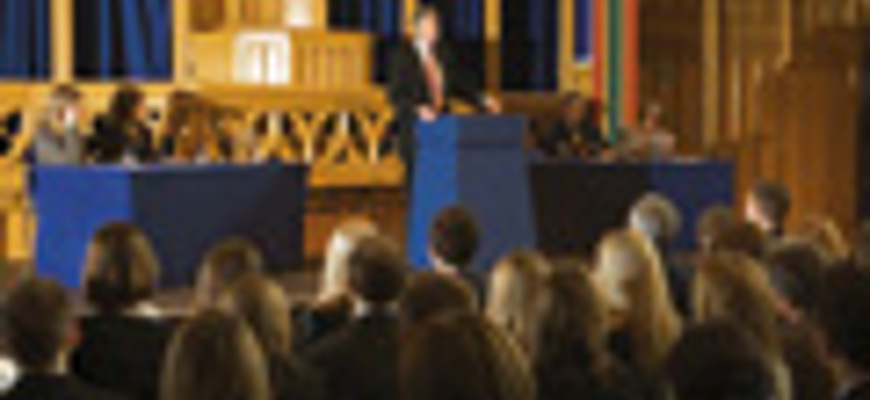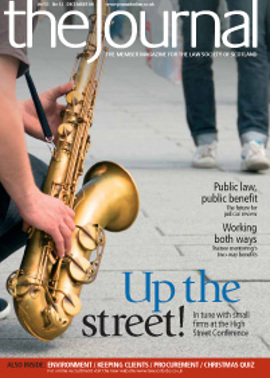Guideline: Scanning and Archiving Documents (November 2008)

Electronic storage of files may be a practical way of dealing with storage.
(1) Scanned documents should preferably be scanned into a native PDF format (100% compatible with the Acrobat standard). Failing that they should certainly be in a format that allows output in PDF. This reflects the Court Technology Forum view that Adobe Acrobat PDF is the de facto cross platform standard.
(2) Subject to compliance with this guidance, retaining a scanned copy having destroyed the original will be deemed compliant with the Society’s Guidance on the Ownership and Destruction of Documents. It is prudent to keep original documents in a "buffer" following scanning for a period of 28 days prior to destruction so that they might be retrieved within that timescale if there is a problem, error, or client query in the interests of risk management. If an original document has not been scanned it should be retained in paper form in terms of this Guideline.
(3) In the event that original documents are to be destroyed (either at point of receipt or at a later date) the intent to do so should be intimated in writing to the client. Tacit consent such as by accepting terms of engagement is acceptable.
(4) The normal duties of care and confidentiality in the storage of clients’ papers in terms of the Code of Conduct would, for the avoidance of doubt, apply to scanned archive material. Offsite electronic copies of the scanned archive should form part of the firm’s contingency planning strategy.
(5) Documents should be scanned before at least one witness and where technology permits would benefit from a digital encrypted signature certifying them a true copy (Adobe Acrobat Professional 8 or later permits this on a batch basis), or alternatively supported by a signed daily logbook certifying authenticity.
(6) Although documents which have only ever existed electronically may be printed and scanned, they should be retained in original format where possible or converted into PDF electronically, thus retaining their “metadata” with its forensic benefits.
(7) Where a mandate is received or clients request a copy of the file, the firm’s obligations in that regard should be covered in terms of engagement. The Society would expect files to be made available within the Society's recommended retention periods. If the terms of engagement are silent on the point, a client is entitled to request the file in either paper or electronic form and any cost of printing from electronic to paper should be borne by the solicitor.
(8) If the firm merges with or is taken over by another firm, care should be taken to ensure systems used to hold scanned documents are compatible and that a paper copy can be printed if required. If new technology supersedes an existing system, scanned material should be transferred to it or a means of reading and printing the material retained.
Terms of engagement should include clarification on:
(1) Whether the firm intends to scan and destroy original documents in accordance with the Society's guidance.
(2) The firm's policy in relation to when original documents are destroyed; for example, immediately upon receipt, or on closure of the file, or on the expiry of the Society's recommended retention periods.
(3) Advice that there is a risk that in any subsequent dispute or court case electronic copies may not have the same status as original documents, potentially reducing their evidential value.
(4) The firm's policy in relation to documents submitted by clients which are not to be destroyed.
(5) Whether or not the firm keeps original documents in a “buffer” for a period prior to destruction.
(6) The firm's policy in relation to mandate requests and if necessary costs associated with paper copies being produced.
(7) The firm's policy in relation to retention of electronic documentation. For example, whether the electronic copies will be retained beyond the Society's recommended retention periods or not.
In this issue
- Sale and purchase agreements – how to avoid the unexpected
- 2008: a year of change; 2009: a year for progress
- Law: it's the business
- Business makeover
- Training plus
- Registers update
- Public service
- One of a kind
- Brussels sprouts more eco-law
- Test yourself
- Trainees try again
- Terms of Business Guidance Note (November 2008)
- Guideline: Scanning and Archiving Documents (November 2008)
- Client, or customer?
- The changing faces of fraud
- Business advice roundup
- The year that crunched
- The anatomy of law firm failures
- Chapter and verse
- The power of agreement
- Under a cloud
- Scottish Solicitors' Discipline Tribunal
- ECJ in the fast lane
- Website review
- Book reviews
- Tender trouble
- Opportunity beckons, Smart tells symposium
- Public money or bust?






